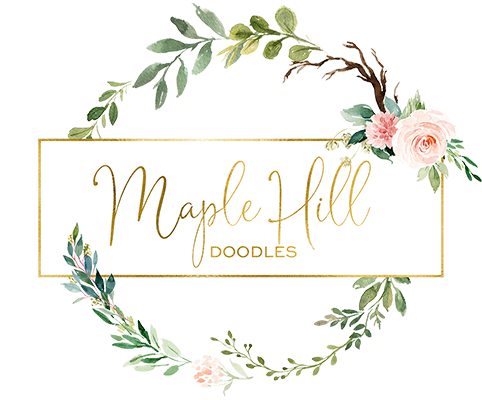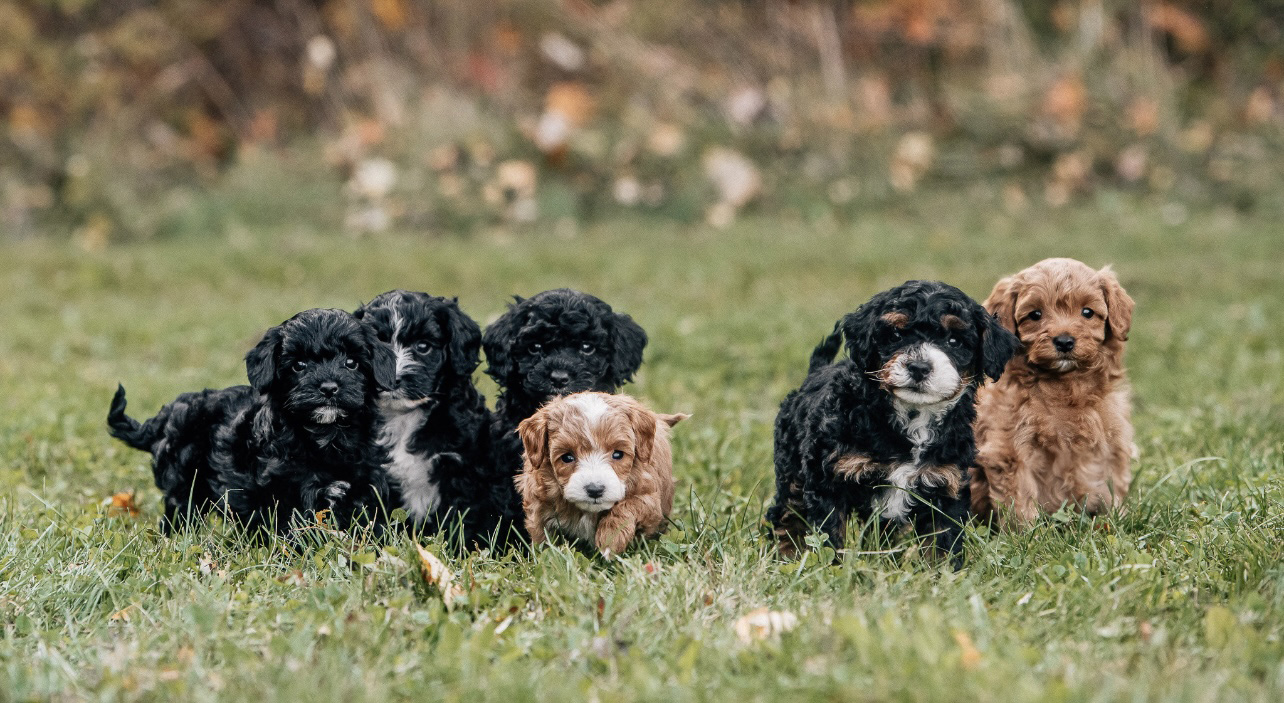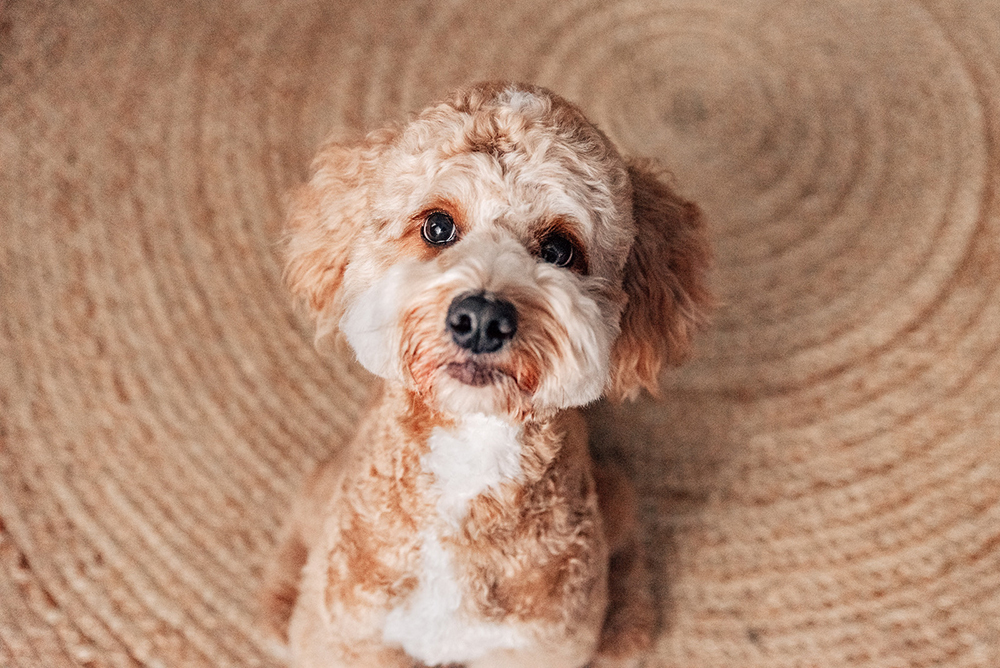Guess what? I may NOT be the breeder for you! And that’s perfectly okay.
Now don’t worry – I’m not trying to talk you out of working with us if we happen to be the perfect fit. (Trust me, I’d love to help you find your dream puppy!) But finding the right breeder isn’t about discovering who’s “the best” – it’s about finding the best match for your family’s specific needs, lifestyle, and expectations.
As a crossbred breeder specializing in Mini Goldendoodles, Cavapoos, and CavaDoodles near Cleveland, Ohio, I’ve learned that one size definitely doesn’t fit all when it comes to breeder-family relationships.
Let’s walk through the key decisions you’ll need to make in your puppy search, so you can find a breeder who’s truly the right fit for you.

Should I Choose a Purebred or Crossbred Dog?
Before diving into breeder types, you’ll want to decide whether a purebred or crossbred puppy aligns better with what you’re looking for.
When Purebred Dogs Make Sense
Purebred dogs offer predictability. You’ll have a clearer picture of size, temperament, grooming needs, and potential health concerns because these traits have been established over generations. According to the American Kennel Club, if you’re looking for specific characteristics – like a hunting companion, show dog, or very particular size requirements – purebreds often provide more consistency.
Why Families Choose Doodle Crossbreeds
Doodle crossbreeds (like the Mini Goldendoodles, Cavapoos, and CavaDoodles I breed) are specifically bred to be companion dogs and family pets – which is exactly what most families are looking for. These crosses can offer the benefits of hybrid vigor, potentially reducing some breed-specific health issues. Research from the University of California, Davis suggests that crossbred dogs may be less prone to certain genetic disorders.
Families are drawn towards crossbreeds like Goldendoodles for their often low-shedding coats, gentle temperaments, and the intentional combination of desirable companion traits from the parent breeds. While first-generation crosses can have more variability, multigenerational doodles (breeding doodle to doodle over a period of generations) actually provide fairly predictable coat and temperament characteristics, with size being predictable to a slightly lesser extent – giving you many of the benefits of both worlds.
Consider your priorities: Do you value predictability and established breed characteristics, or are you excited about the potential benefits and variety that come with crossbreeding?
F1 vs Multigenerational Goldendoodle: What’s the Difference?
If you’ve decided on a doodle crossbreed, one of the most important decisions you’ll make is choosing between an F1 (first generation) or multigenerational Goldendoodle. Understanding this difference can significantly impact your puppy’s predictability and characteristics.
What is an F1 Goldendoodle?
An F1 Goldendoodle is a first-generation cross between a purebred Golden Retriever and a purebred Poodle. While F1s can be wonderful family pets, they tend to have more variability in size, coat type, and temperament since you’re combining two different breeds for the first time.
What is a Multigenerational Goldendoodle?
A multigenerational Goldendoodle (often called “multigen”) comes from breeding Goldendoodle to Goldendoodle over a period of generations. This creates much more predictability in the offspring while maintaining the hybrid vigor benefits of crossbreeding.
Why Choose Multigenerational Over F1?
Coat predictability: Multigen Goldendoodles have fairly predictable coat types, typically low-shedding and more consistent in texture. F1s can vary significantly – some may shed like a Golden Retriever, others may have a Poodle-like coat.
Temperament consistency: After several generations of selecting for ideal family companion traits, multigen dogs tend to have more reliable, gentle temperaments that work well with children and other pets.
Size reliability: While size is predictable to a slightly lesser extent than coat and temperament, multigen breeding typically produces more consistent sizing within expected ranges.
Reduced shedding: Most multigen Goldendoodles inherit the low-shedding characteristics that families specifically seek in doodle breeds.
For families looking for the predictability of a companion dog bred specifically for family life, multigenerational Goldendoodles often provide the best balance of hybrid benefits with reliable characteristics.
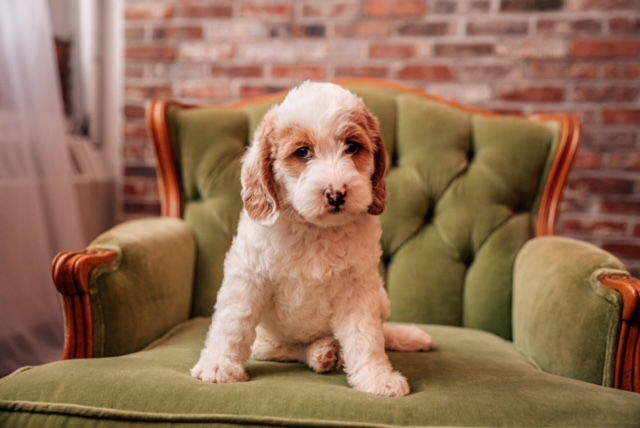
What’s the Difference Between Home-Based and Commercial Breeders?
Understanding the trade-offs between these two approaches helps you make the right choice for your family.
Should I Choose a Home-Based Breeder?
What you gain with home-based breeders:
- Puppies are whelped and raised in the family environment – often in bedrooms and living spaces
- Constant exposure to household sounds, daily routines, and real family life from birth
- Individual attention and handling during critical developmental periods
- Early neurological stimulation through natural household activity
- Socialization with vacuum cleaners, doorbells, and normal home chaos
- Personal relationships with breeders who often stay connected long-term
- Crate training, desensitization work, and enrichment activities
What you might give up:
- Many home-based breeders maintain strict visitor policies, which means you likely won’t visit before pickup or meet parent dogs in person
- You’ll rely on photos, videos, reviews, and testimonials to assess the breeder’s practices
- Home-based breeders won’t have kennels you can tour or several litters to choose from
Are Commercial Breeders Better?
What you gain with commercial breeders:
- More likely to allow visits to tour the kennels and see their operation firsthand
- Ability to choose from multiple litters and meet parent dogs
- Transparency through direct observation
What you might give up:
- Puppies may have no exposure to household sounds and family routines during early weeks
- Less individual handling time due to larger numbers of puppies
- More adjustment needed to household noises like dishwashers and everyday home sounds
- Typically don’t provide crate training, desensitization work, and enrichment activities that home-based breeders offer
- Higher risk of disease and parasites due to less stringent biosecurity and potentially crowded conditions
Why Don’t Home-Based Breeders Allow Visits?
This is probably the most frequently asked question about home-based breeders. If you’re wondering “Why can’t I visit the breeder before buying a puppy?” here’s the honest answer.
While a few home-based breeders still allow visits from families on their waitlist, more and more are understanding the risks and changing their policies. Safety and security concerns naturally arise when sharing your home address and inviting strangers into personal living spaces. From a health perspective, home-based breeders often maintain strict biosecurity protocols since unknown visitors can inadvertently bring diseases, parasites, or viruses on their clothing and shoes – especially concerning when puppies have developing immune systems.
According to veterinary biosecurity guidelines, limiting exposure during critical puppy development periods is considered a best practice.
While home-based breeders believe strongly in raising puppies in a family environment, opening personal residences to unknown visitors isn’t conducive to the work-life balance that’s essential for sustainable breeding.
Unlike commercial facilities designed for public access, most homes lack separate entrances, adequate parking, or facilities to accommodate regular visitors. There are also insurance and liability considerations that residential properties face differently than commercial facilities.
These aren’t arbitrary rules – they’re thoughtful boundaries that protect the puppies, preserve the breeding program’s quality, and maintain the intimate home environment that likely drew you to home-based breeders in the first place.
How Do I Know Which Type of Breeder Is Right for Me?
Take a moment to honestly assess what matters most to you:
Questions to Ask Yourself:
- Is seeing the facility and meeting parent dogs essential for your confidence in the breeder?
- Are you comfortable evaluating a breeder through videos, photos, and detailed communication?
- Do you value the intensive early socialization that comes from puppies being raised in active family homes?
- How important is immediate availability versus waiting for the right match?
- Are you looking for ongoing support and a long-term relationship with your breeder?
Consider Your Lifestyle:
- Do you have time to properly socialize a puppy who might need extra exposure to household sounds?
- Are you prepared to trust a breeder’s expertise without seeing everything firsthand?
- How much guidance do you need throughout the puppy selection process?
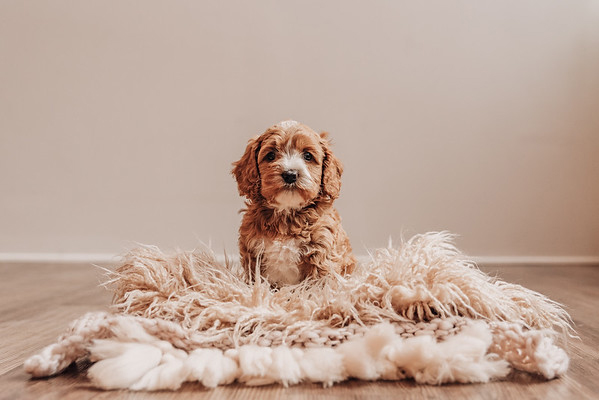
What Are Red Flags vs. Different Approaches When Choosing a Breeder?
It’s crucial to distinguish between genuinely concerning practices and simply different business models. Many people ask “How do I know if a breeder is reputable?” Here’s how to tell the difference.
Actual Red Flags Include:
- Refusing to provide health testing information for parent dogs
- Unwillingness to answer specific questions about their breeding practices
- No reviews from previous puppy clients
- Pressure to decide immediately
- No health guarantee or written contract
- No vetting process for potential puppy families
- Puppies don’t receive a comprehensive veterinary examination before placement
Different Approaches That Aren’t Red Flags:
- Limiting or restricting home visits for safety/biosecurity reasons
- Specific communication windows or business hours
- Detailed application processes and waiting lists
- Using videos and photos instead of in-person meetings
- Different pickup procedures or neutral meeting locations
- Requiring deposits to hold puppies
A reputable breeder – whether home-based or commercial – should be transparent about their practices, willing to answer questions, have reviews from previous clients, and demonstrate genuine care for their puppies’ wellbeing.
How to Spot a Puppy Mill vs. Reputable Breeder
Understanding the difference between puppy mills and reputable breeders is crucial for making an ethical choice. Puppy mills prioritize profit over puppy welfare, while reputable breeders focus on producing healthy, well-socialized companion dogs.
Puppy Mill Warning Signs:
- Many breeds available at all times with immediate pickup
- No health testing or unwillingness to provide documentation
- Puppies sold through brokers, pet stores, or “retail rescues”
- No questions asked about your family or lifestyle
- Poor living conditions, overcrowding, or unsanitary facilities
- Parent dogs in poor physical condition
Reputable Breeder Characteristics:
- Limited breeds with waiting lists and planned litters
- Comprehensive health testing with readily available results
- Detailed screening process and application requirements
- Ongoing support and willingness to take dogs back if needed
- Clean, appropriate living conditions for dogs and puppies
- Parent dogs are healthy, well-cared-for family members
- Professional contracts and health guarantees
What to Expect from a Reputable Breeder
If you’re wondering what working with an ethical breeder looks like, here’s what you can reasonably expect throughout the process:
Communication and Transparency:
- Prompt, professional responses to your questions (usually within 24-48 hours during business days)
- Willingness to provide detailed information about their breeding practices
- Open discussion about both the benefits and challenges of their breed
- Regular updates with photos and videos of your puppy’s development
Health and Documentation:
- Complete health testing results for parent dogs readily available
- Veterinary records and health clearances for puppies
- Written contracts outlining health guarantees and responsibilities
- Vaccination and deworming schedules clearly documented
Puppy Preparation:
- Early socialization and handling from birth
- Age-appropriate training and enrichment activities
- Proper weaning timeline (typically 8 weeks minimum)
- Comprehensive puppy preparation including crate training basics
Ongoing Support:
- Availability for questions and guidance throughout your dog’s life
- Resources for training, grooming, and care recommendations
- Willingness to take the dog back if circumstances change
- Connection to a community of other families from their program
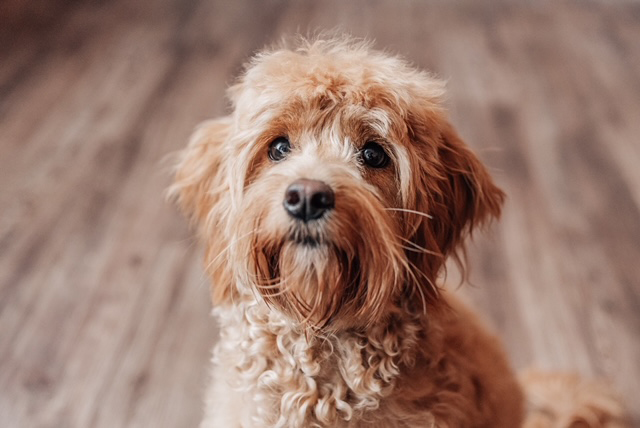
Breeder Application Process: What to Expect
Reputable breeders use application processes to ensure their puppies go to suitable homes. If you’re wondering why breeders require applications or what to expect, here’s the typical process:
Why Breeders Screen Families:
- Ensure puppies go to homes prepared for their needs
- Match puppy temperaments with appropriate families
- Reduce the likelihood of dogs being surrendered or rehomed
- Build long-term relationships with committed families
Typical Application Questions:
- Your experience with dogs and specific breed knowledge
- Living situation (home, apartment, yard, etc.)
- Family composition and lifestyle considerations
- Plans for training, exercise, and grooming
- Veterinary care plans and emergency preparedness
- What you’re looking for in a companion dog
Timeline and Process:
- Application submission: Detailed questionnaire and sometimes references
- Initial screening: Breeder reviews application and may request additional information
- Interview/conversation: Phone or video call to discuss your needs and their program
- Approval and waiting list: If approved, you’re placed on waiting list for appropriate litter
- Puppy matching: Breeder helps match specific puppy to your family’s needs
- Preparation period: Final arrangements, contracts, and pickup coordination
What Happens if You’re Not Approved:
Reputable breeders may decline applications if they feel their breed or specific puppy isn’t the right fit. This isn’t personal – it’s responsible breeding focused on successful matches. They may:
- Suggest a different breed or breeder that better fits your needs
- Recommend waiting until your situation changes
- Provide guidance on preparation for future applications
Remember, a thorough application process is actually a sign of a reputable breeder who cares about their puppies’ futures.
How Do I Find the Right Breeder for My Family?
The best breeder for you is one whose communication style, values, and practices align with what your family values. Some families thrive with the hands-on, visit-first approach of commercial breeders. Others prefer the intimate, family-style environment of home-based breeders and are comfortable building trust through detailed communication and documentation.
Neither approach is inherently better – they serve different family preferences and values.
Your Next Steps:
- Decide breed type: Determine if purebred or crossbred fits your lifestyle
- Choose breeder style: Decide if you prefer commercial access or home-based intimacy
- Research local options: Look for Cleveland area doodle breeders or reputable breeders in Northeast Ohio
- Ask detailed questions: Inquire about their specific health testing and practices
- Request references: Contact recent puppy families about their experience
- Trust your instincts: Pay attention to communication style and transparency
For more guidance on what questions to ask potential breeders, check out our comprehensive guide.
What Should I Expect When Working with a Home-Based Breeder?
If you decide a home-based breeder is right for you, here’s what the process typically looks like:
- Application process: Most reputable home-based breeders have detailed applications
- Communication style: Expect personal, detailed responses but within business hours
- Documentation: You’ll receive plenty of photos, videos, and health information
- Pickup process: This may happen at the breeder’s home or a neutral location
- Ongoing support: Many home-based breeders offer lifetime support for their puppies
Remember, you’re not just buying a puppy – you’re choosing a breeder who will hopefully provide support and guidance throughout your dog’s life. The right match will feel comfortable, transparent, and aligned with your values from the very first conversation.
Finding Your Perfect Breeder Match
There truly is a lid for every pot in the breeding world. Whether you choose a purebred from a commercial breeder or a crossbred puppy from a home-based program, the key is finding someone whose approach matches your values.
Take time to research, ask questions, and trust your instincts. The right breeder will welcome your questions, provide clear information about their practices, and help you feel confident in your decision.
Looking for a crossbred breeder who specializes in Mini Goldendoodles, Cavapoos, and CavaDoodles near Cleveland, Ohio? Learn more about our home-based breeding program and see if we might be the right fit for your family.
Ready to start your search? View our available puppies or contact us with questions about our upcoming litters.
